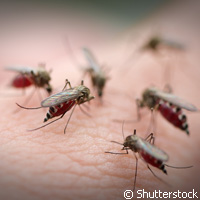Mystery over shrinking malaria mosquito population
Scientists in Denmark and Tanzania have found that the mosquito carrying the malaria parasite is losing ground in various villages. The big question is why. Experts have been scratching their heads; there is no organised mosquito control, so how come 99% of these mosquitoes has disappeared?. While a number of theories have emerged, the lack of proper data cannot substantiate whether malaria is being eradicated or whether it is just dormant until the next wave hits. The study, presented in the Malaria Journal, was funded in part by the EU. 'Many of our fellow malaria researchers think that the fall in countries such as Tanzania, Eritrea, Rwanda, Kenya and Zambia shows that all the control programmes are working, particularly the use of mosquito nets,' explains lead author Professor Dan Meyrowitsch from the Department of Health Services Research at the University of Copenhagen in Denmark. 'That just isn't the whole story. For more than 10 years we have been collecting and counting the number of mosquitoes in Tanzanian villages. The number in our traps fell from 5 300 in 2004 to just 14 in 2009, and these were from villages without mosquito nets.' Professor Meyrowitsch suggests that the 99% drop in the malaria mosquito population in the latter half of the 1990s is linked to a drop in precipitation, adding that this may have been triggered by global climate changes. 'From 2003 to 2009 the volume of precipitation was more stable, but the rain was more chaotic and fell outside the rainy season,' he says. 'And this may have disturbed the natural cycle of mosquito development. Of course it is great that the number of malaria-related fatalities among children has fallen drastically in the last five or six years, but we need to know why!' The team points out that since mosquito nets can be discounted, what needs to be determined is whether the mosquitoes succumbed to disease or communities have been using pesticides, or whether the drop is the result of chaotic new precipitation patterns. 'Unless we find the answer we will not be able to predict when the malaria mosquitoes will come back,' says Professor Meyrowitsch, 'and that could rapidly prove critical.' The team suggests that because several children and adults have not been exposed to malaria since 2005, they have either lost or failed to develop immunity to the parasite. The re-emergence of the mosquitoes could signify the presence of dramatic malaria epidemics with many deaths unless the population and health officials are prepared, according to the team. Scientists from the Department of International Health, Immunology and Microbiology, the Department of Public Health, and the Department of Veterinary Disease Biology at the University of Copenhagen, as well as researchers from the National Institute for Medical Research in Tanzania contributed to the study.For more information, please visit:University of Copenhagen:http://www.ku.dk/english/Malaria Journal:http://www.malariajournal.com/
Countries
Denmark, Tanzania



